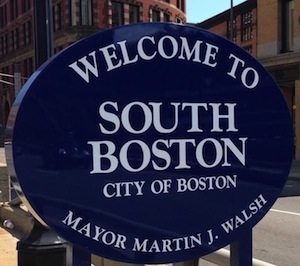
The Edison Plant, a Helipad, a Soccer Stadium, expanded transportation spurs and bus service, a transforming Dorchester Avenue initiative. Using a sports metaphor, this neighborhood has been facing fastballs, curveballs, sliders, change-ups and an eephus pitch or two. Fortunately, South Boston has a formidable line-up of elected officials in Lynch, Forry, Collins, Flaherty and Linehan, who need to guide the residents and influence the decision makers as these pitches are thrown. There is no time to rest.
The Edison Plant is going to be re-developed and tours of this monstrosity with a history of health care impacts on the neighborhood are being conducted and it behooves residents to stay on top of this prospective megaplex at a gateway to the community.
GE and the City want a helipad and will be aggressive at making it a reality. There will be a first meeting on January 30 at 7pm in the Amphitheater at the World Trade Center. MassDOT announced the members of a Helipad Task Force as promoted by Rep. Nick Collins in November 2016. The Task Force includes State Senator Linda Dorcena-Forry, State Representative Nick Collins, District City Councilor Bill Linehan, and at-large Councilor Michael Flaherty appointed by Council President Michelle Wu, MassDOT Secretary and CEO Stephanie Pollack, Massachusetts Secretary of Economic Development Jay Ash, Massport Executive Director Tom Glynn, Boston Director of Economic Development John Barros, and Boston Planning and Development Agency representative Sonal Gandhi.
Senator Linda Dorcena Forry, Rep. Nick Collins and Congressman Stephen Lynch have challenged the process for siting any development proposal for the Bayside Expo Center land owned by UMass Boston including a soccer stadium. Its effect on South Boston and Dorchester is an opportunity for leverage regarding the bottleneck of Kosciusko Circle and the reality of UMass Boston as an economic driver to benefit both neighborhoods and the City.
Rep. Nick Collins and Senator Linda Dorcena Forry have called upon the MBTA to revive a dormant transportation study’s recommendation to expand the rapid transit service from South Station and New Market Square by rail to the Back Bay and South Boston Waterfront respectively. In doing so, they have elevated and drawn attention to the perennial promise of providing a vehicle for expanding economic opportunity to the SouthWest corridor communities. The issue of improved bus service from City Point to both downtown and Copley Square is a major challenge of logistics and needs the MBTA to step up.
The Dorchester Avenue redevelopment plan, with Washington Village at Andrew Square on one end and the Railyards near Broadway at the other, is underway and will provide housing options that could relieve the pressure on South Boston proper to absorb the influx of new residents and those from the community who want to stay in the neighborhood area they were raised in.
Indeed, South Boston and its residents have a lot to monitor and react to now and into the immediate future. Our elected leaders are paying attention and so should we all.














